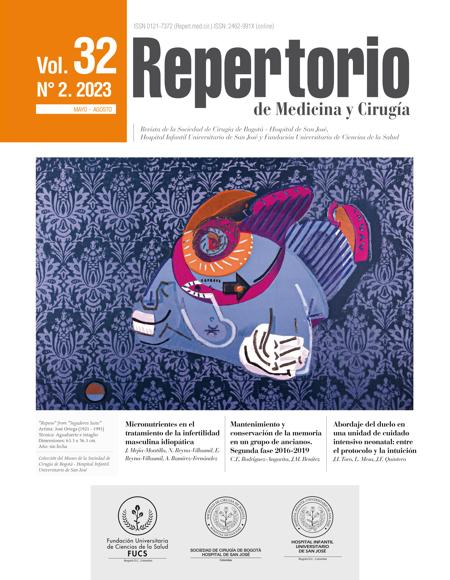Memory maintenance and preservation in an elderly group. Second phase 2016-2019
Mantenimiento y conservación de la memoria en un grupo de ancianos. Segunda fase 2016-2019
Main Article Content
Abstract
Objective: to determine the differences in the results among a group of older adults attending a memory maintenance and preservation program, three years after the first evaluation. Materials and methods: historical cohort study comparing the initial measure in 2016 with the final measure in 2019, to establish the difference in cognitive deterioration, signs of depression, anxiety, somatic symptoms, social dysfunction, and life satisfaction. Results and discussion: twenty of the 21 participants of the original cohort were studied. Present mean age was 76.5 ± 7.1 years. The only difference in the sociodemographic variables was that one woman became widowed. Cognitive deterioration without dementia increased in 16.2%, from 23.8% (n: 5) to 40% (n: 8). Ten percent (10%) developed dementia. Somatic complaints and depression disappeared, and anxiety at perception of health status appeared, life satisfaction decreased in 55%. Conclusions: progression to mild cognitive impairment (MCI) or dementia was like in the general population. Satisfaction with life decreased despite perception of general health status improved in all participants. The level of participation, adherence, and social integration among the elderly group during nine- years support the memory maintenance and preservation program activities.
Keywords:
Downloads
Article Details
References
Licher S, Leening MJG, Yilmaz P, Wolters FJ, Heeringa J, Bindels PJE, et al. Development and Validation of a Dementia Risk Prediction Model in the General Population: An Analysis of Three Longitudinal Studies. Am J Psychiatry. 2019;176(7):543-51. https://doi.org/10.1176/appi.ajp.2018.18050566
Johnson SC, Asthana S. Predicting Risk for Dementia: Is It Ready for the Clinic? Am J Psychiatry. 2019;176(7):501-2. https://doi.org/10.1176/appi.ajp.2019.19050520
Palmer K, Wang HX, Bäckman L, Winblad B, Fratiglioni L. Differential evolution of cognitive impairment in nondemented older persons: results from the Kungsholmen Project. Am J Psychiatry. 2002;159(3):436-42. doi: https://doi.org/10.1176/appi.ajp.159.3.436.
Petersen RC, Doody R, Kurz A, Mohs RC, Morris JC, Rabins PV, et al. Current concepts in mild cognitive impairment. Archives of neurology. 2001;58(12):1985-92. doi: 10.1001/archneur.58.12.1985
Petersen RC. Mild cognitive impairment as a diagnostic entity. J Intern Med. 2004;256(3):183-94. https://doi.org/10.1111/j.1365-2796.2004.01388.x
Jongsiriyanyong S, Limpawattana P. Mild Cognitive Impairment in Clinical Practice: A Review Article. Am J Alzheimers Dis Other Demen. 2018;33(8):500-7. https://doi.org/10.1177/1533317518791401
Yaffe K, Petersen RC, Lindquist K, Kramer J, Miller B. Subtype of mild cognitive impairment and progression to dementia and death. Dement Geriatr Cogn Disord. 2006;22(4):312-9. doi: 10.1159/000095427
Plassman BL, Langa KM, Fisher GG, Heeringa SG, Weir DR, Ofstedal MB, et al. Prevalence of cognitive impairment without dementia in the United States. Ann Intern Med. 2008;148(6):427-34. https://doi.org/10.7326/0003-4819-148-6-200803180-00005
Farias ST, Mungas D, Reed BR, Harvey D, DeCarli C. Progression of mild cognitive impairment to dementia in clinic- vs community-based cohorts. Arch Neurol. 2009;66(9):1151-7. https://doi.org/10.1001/archneurol.2009.106
Bohlken J, Jacob L, Kostev K. Progression of mild cognitive impairment to dementia in German specialist practices. Dementia (London). 2019;18(1):380-90. https://doi.org/10.1177/1471301216673919
Organización Mundial de la Salud, Grupo Orgánico de Enfermedades No Transmisibles y Salud Mental, Departamento de Prevención de las Enfermedades No Transmisibles y Promoción de la Salud, Envejecimiento y Ciclo Vital. Envejecimiento activo: un marco político. Rev Esp Geriatr Gerontol. 2002;37(s2):74-105.
Rodríguez-Angarita CE, Puentes T. "Mantenimiento y conservación de la memoria, un aporte de salud mental al envejecimiento activo". Repert Med Cir. 2011;20(1):51-5. https://doi.org/10.31260/RepertMedCir.v20.n1.2011.675
Stern Y, Barnes CA, Grady C, Jones RN, Raz N. Brain reserve, cognitive reserve, compensation, and maintenance: operationalization, validity, and mechanisms of cognitive resilience. Neurobiol Aing. 2019;83:124-9. https://doi.org/10.1016/B978-0-12-804766-8.00011-X
Stern Y, Barulli D. Cognitive reserve. Handb Clin Neurol. 2019;167:181-90. https://doi.org/10.1016/B978-0-12-804766-8.00011-X
Stern Y. What is cognitive reserve? Theory and research application of the reserve concept. J Int Neuropsychol Soc. 2002;8(3):448-60.
Stern Y. Elaborating a hypothetical concept: comments on the special series on cognitive reserve. Journal of the International Neuropsychological Society : JINS. 2011;17(4):639-42. https://doi.org/10.1017/S1355617711000579
Kawashima R. Mental exercises for cognitive function: clinical evidence. Journal of preventive medicine and public health = Yebang Uihakhoe chi. 2013;46Suppl 1(Suppl 1):S22-7. https://doi.org/10.3961/jpmph.2013.46.S.S22
Kawashima R, Taira M, Okita K, Inoue K, Tajima N, Yoshida H, et al. A functional MRI study of simple arithmetic--a comparison between children and adults. Brain Res Cogn Brain Res. 2004;18(3):227-33. https://doi.org/10.1016/j.cogbrainres.2003.10.009
Miura N, Iwata K, Watanabe J, Sugiura M, Akitsuki Y, Sassa Y, et al. Cortical activation during reading aloud of long sentences: fMRI study. Neuroreport. 2003;14(12):1563-6. https://doi.org/10.1097/00001756-200308260-00004
Nouchi R, Taki Y, Takeuchi H, Hashizume H, Akitsuki Y, Shigemune Y, et al. Brain training game improves executive functions and processing speed in the elderly: a randomized controlled trial. PloS one. 2012;7(1):e29676. https://doi.org/10.1371/journal.pone.0029676
Rodríguez-Angarita CE. Mantenimiento y conservación de la memoria en un grupo de ancianos. Repert Med Cir. 2017;26(4):219–24. https://doi.org/10.1016/j.reper.2017.10.004
Ostrosky-Solis F, Ardila A, Rosselli M. NEUROPSI: a brief neuropsychological test battery in Spanish with norms by age and educational level. J Int Neuropsychol Soc. 1999;5(5):413-33. doi: 10.1017/s1355617799555045
Lobo A, Perez-Echeverria MJ, Artal J. Validity of the scaled version of the General Health Questionnaire (GHQ-28) in a Spanish population. Psychol Med. 1986;16(1):135-40. https://doi.org/10.1017/s0033291700002579
Diener E, Emmons RA, Larsen RJ, Griffin S. The Satisfaction With Life Scale. Journal of personality assessment. 1985;49(1):71-5. https://doi.org/10.1207/s15327752jpa4901_13
Pavot W, Diener E. Review of the Satisfaction With Life Scale. Psychological Assessment. 1993;5(2):164-172. https://doi.org/10.1037/1040-3590.5.2.164
Petersen RC, Lopez O, Armstrong MJ, Getchius TSD, Ganguli M, Gloss D, et al. Practice guideline update summary: Mild cognitive impairment: Report of the Guideline Development, Dissemination, and Implementation Subcommittee of the American Academy of Neurology. Neurology. 2018;90(3):126-35. https://doi.org/10.1212/WNL.0000000000004826
Pandya SY, Lacritz LH, Weiner MF, Deschner M, Woon FL. Predictors of Reversion from Mild Cognitive Impairment to Normal Cognition. Dement Geriatr Cogn Disord. 2017;43(3-4):204-14. https://doi.org/10.1159/000456070



